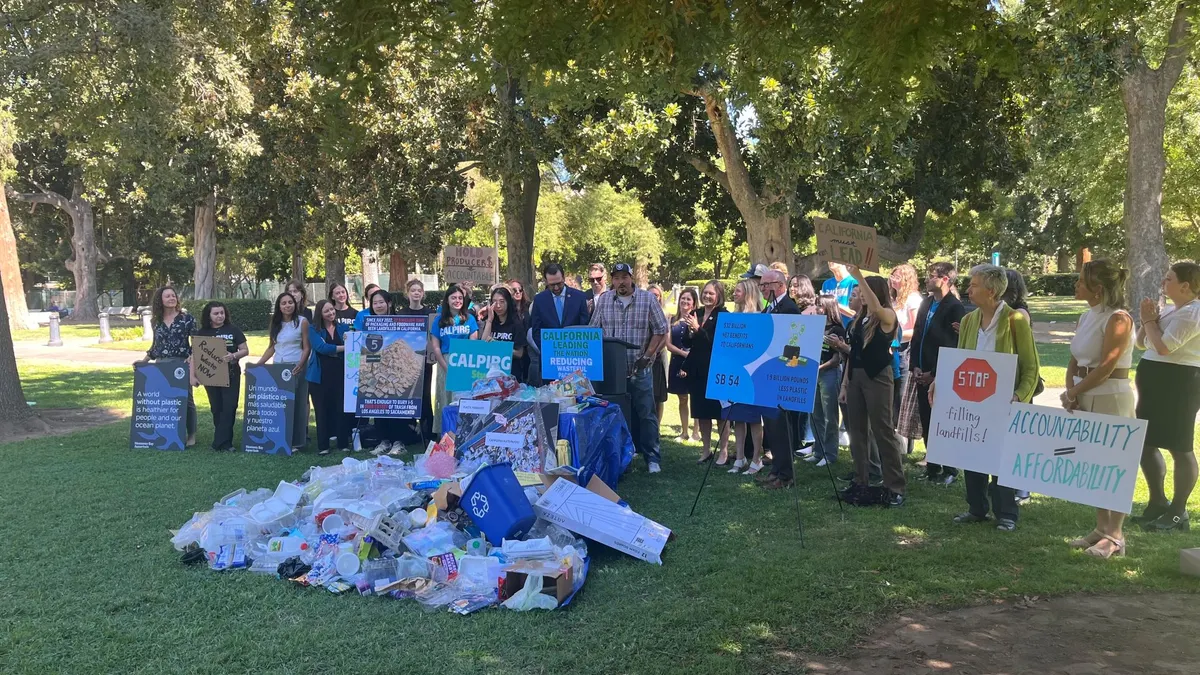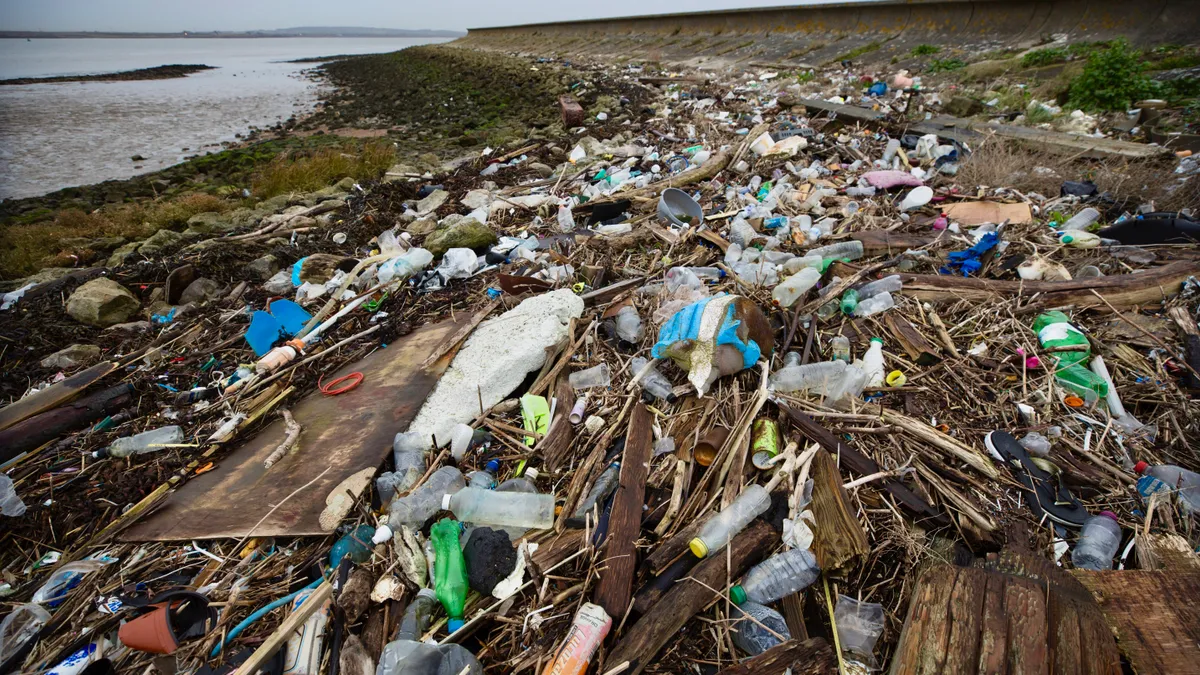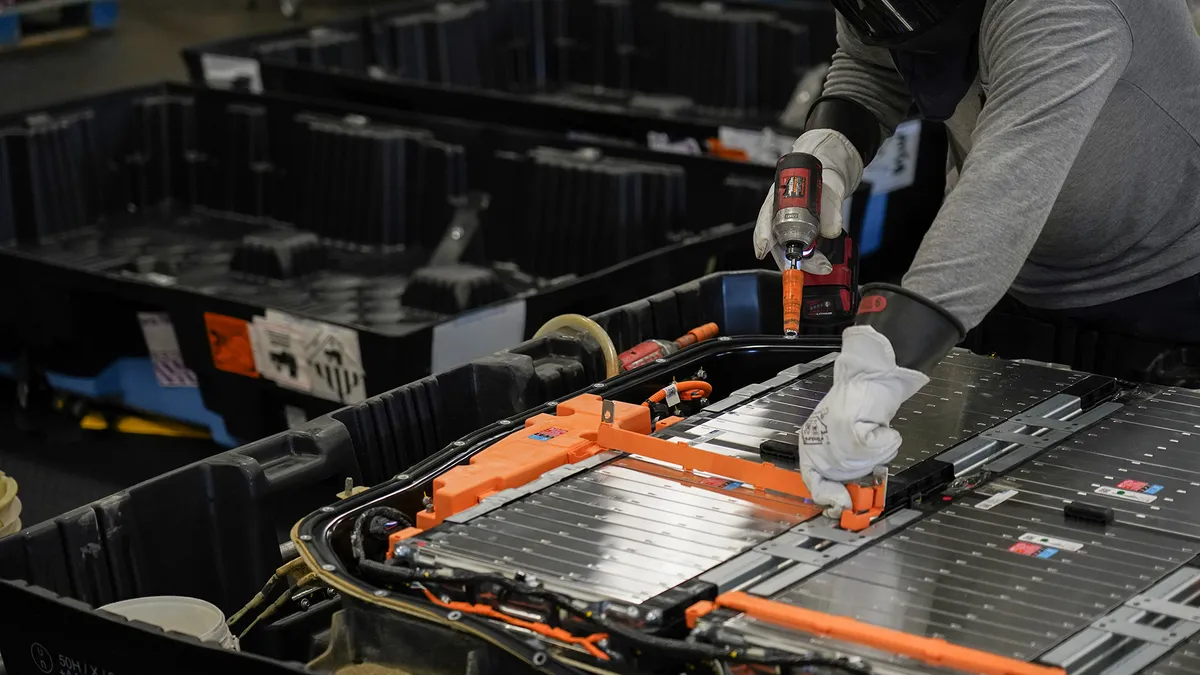Concerns about the potential for spreading the new coronavirus spurred at least four states and many more municipalities to stall or suspend plastic bag regulations early on during the pandemic. Some of those suspensions are now expiring, while others remain in place with an unclear timeline — potentially impacting recycling operations and the broader waste stream.
Those suspensions added to a public debate over plastics, with proponents saying the pandemic has shown the value of single-use bags. Environmental groups have struck a careful tone on the suspensions and a number of "zero waste" advocates told Waste Dive the priority for lawmakers should be public health, even as they dispute the benefit of abandoning reusable items.
But plastic bags are contaminants in the waste stream and some recyclers are wary of moves to prolong suspensions of regulations. Kate Davenport, co-president of the nonprofit Minnesota-based Eureka Recycling, told Waste Dive that her organization has been involved in conversations with local grocery stores about decisions to suspend plastic bag collection, for example, and related issues that could ultimately affect MRFs.
"The long-term trend there is concerning," she said, speaking about the potential for a resurgence in single-use bags.
Swift decisions stall growing momentum
When the pandemic first ramped up nationally, knowledge about how the virus spread was in preliminary stages. Initial research showed it could live on certain surfaces for up to three days — including plastics and stainless steel — and concern over the potential for transmission via reusable items spurred swift action from state and local officials.
But testing for viruses on surfaces is tricky and the coronavirus is no different. The research cited to justify single-use plastics over reusable items has been partially linked to industry, drawing scrutiny from critics. And the U.S. Centers for Disease Control and Prevention (CDC) has found the virus is largely spread person-to-person, as opposed to surface-to-person. Even so, the agency has also advised using disposable items at establishments like restaurants.
The CDC guidance sends mixed messages, Kirstie Pecci, director of the Zero Waste Project at the Conservation Law Foundation (CLF), told Waste Dive. She pointed to the emerging science around the virus and said it is time for the reusable bag suspensions to lift and for establishments to consider shifting away from single-use plastics. CLF has been lobbying officials in Massachusetts to lift the state's temporary ban on reusable bags.
"We wanted to be careful. Now that we have more information, we know that single-use plastics are not part of the answer," said Pecci.
Environmental groups expressed concern that the pandemic-related embrace of plastics could slow the momentum behind efforts to adopt legislation banning plastic bags. That momentum has been building at the local and state level, with federal efforts also moving forward through the Break Free From Plastic Pollution Act, which debuted in early February and would ban plastic carry-out bags among other provisions.
"[We had] high hopes for this legislative session," Jennie Romer, legal associate for the Surfrider Foundation's Plastic Pollution Initiative, told Waste Dive. "And we've definitely hit a lot of bumps in the road there."
Plastics proponents, however, see the pandemic as proof that single-use items are important for public health. "If I had a hope of what this does, it changes the dialogue a little bit," said Matt Seaholm, executive director for the American Recycled Plastic Bag Association (ARPBA).
Conversations around plastics often involve a "binary choice" that leaves out solutions like expanding recycling infrastructure while maintaining plastic as a part of public life, Seaholm told Waste Dive. "Maybe banning them is not the right way to go," he said.
But some MRF operators have long supported legislation banning plastic bags. Davenport of Eureka told Waste Dive that it can cost between $75,000 and $100,000 annually to manage their presence in the recycling stream.
"Plastic bags continue to be the bane of our existence," she said, saying the items wrap around machinery at Eureka's MRF, leading to two-hour shutdowns to fix the problem.
Many MRF operators share these concerns, although some feel more curbside recycling education could solve the problem as opposed to policy changes. But if attention around bag bans declines, some say, the issues raised by Davenport and others may mount.
Impacts across states, municipalities
Research done by Waste Dive found state responses to the pandemic range when it comes to bag policy. New York's bag ban was already delayed when the state suspended it. California suspended its ban, while Maine postponed its ban's implementation date to January 2021.
By contrast, Oregon did not suspend its ban. Washington, Vermont, and Delaware are also still on track to enact bans in the future, as is Connecticut, although that state did suspend its single-use bag fee through June. New Hampshire has no plastic bag ban, but the state has briefly banned reusable bags, as have Massachusetts and Illinois. Hawaii has a de facto statewide ban as its counties have individually banned plastic bags, but Hawaii County suspended its ordinance until May 30.
| States | Ban Status | Fee Status | Suspension Date | Effective Until |
| California | Suspended | Suspended | April 22, 2020 | June 21, 2020 |
| Connecticut* | Banned beginning July 1, 2021 | Suspended | March 26, 2020 | June 30, 2020 |
| Delaware* | Banned beginning Jan. 1, 2021 | N/A | N/A | N/A |
| Maine | Postponed | N/A | March 20, 2020 | Jan. 15, 2021 |
| New York | Suspended | Suspended | March 1, 2020 | June 15, 2020 |
| Oregon | Not Suspended | Not Suspended | N/A | N/A |
| Vermont* | Banned beginning July 1, 2020 | Not yet in effect | N/A | N/A |
| Washington* | Banned beginning Jan. 1, 2021 | Not yet in effect | N/A | N/A |
*Have not yet taken effect
Municipalities also ranged in their reactions — Boston, Los Angeles, San Francisco, and Seattle suspended their bans, but Chicago did not.
Smaller areas also debated the issue. Montgomery County in Maryland, for example, briefly considered suspending its tax on carryout plastic and paper bags, but ultimately decided not to, following advice from the county's health officer who recommended washing reusable bags between trips to the store.
MRF operators told Waste Dive it can be hard to quantify how the suspensions have impacted the waste stream. Some noted the number of plastic bags entering facilities is already very high and can obscure any surges.
In California, Recology Sonoma Marin has noticed an uptick in plastic bag contamination at its MRF. However, a spokesperson for Recology San Francisco told Waste Dive it has not needed to increase the amount of time spent cutting loose plastic bags out of sorting equipment at its Recycle Central MRF. In an emailed statement, the operator said that suggests the amount of loose plastic bags in the city's blue bins has not changed.
But overall tons entering the facility are down due to decreases in commercial business, according to the company.
"Prior to the outbreak we were processing 650 tons a day of incoming material at Recycle Central," said the spokesperson. "Since [the city] instituted its shelter-in-place policy, incoming tons have averaged 500 tons per day."
Minnesota does not have a plastic bag ban and Minneapolis, where Eureka is based, has not suspended its 5-cent bag fee. Jennifer Nguyen Moore, recycling administrator for the Minnesota Pollution Control Agency, told Waste Dive her agency receives MRF data annually and so does not have any up-to-date numbers. Davenport similarly said she was unsure if her MRF has seen an uptick in plastic bags due to the pandemic. But she also questioned the rationale behind suspensions more broadly.
"If reusables carry the coronavirus, then so do plastic bags," she said.
Seaholm of ARPBA said his organization did not lobby cities or states to suspend their plastic bag ordinances when the pandemic first ramped up in the United States. But he pointed to decisions made by governors and local officials as an indicator of the role plastic bags can play. While he said no MRFs reached out to ARPBA about potential issues involving the uptick in bags, Seaholm noted the problems they pose for operators.
"As advocates we can all agree that we need to improve the recycling infrastructure," he said.
ARPBA testified in support of H.B. 242 in Ohio, which would prohibit local plastic bag bans for 12 months due to the pandemic. The Ohio Senate passed its version of the bill late last month, and it is now in the Ohio House, which passed a version in December that would have permanently preempted such bans. Cleveland has a ban scheduled to take effect in July, which would be affected by the law.
Other areas are seeing similar moves. Citing COVID-19, state-level Republicans in Pennsylvania inserted a budget provision keeping municipalities from enforcing regulations on single-use plastics, extending a prior preemptive move set to expire in July by a year. That impacts a Philadelphia bag ban previously set to go into effect in January — already delayed due to the virus — along with other municipalities.
Despite those trends, Romer of Surfrider expressed long-term optimism about anti-plastics legislation and said her organization is still speaking with lawmakers interested in bag bans. As the pandemic remains ongoing, Romer also said she had hope that public concern about plastics might maintain momentum.
"We understand if it's not front of mind right now," Romer said. "But it's still a problem."
Additional research by Jakob Geiger

















